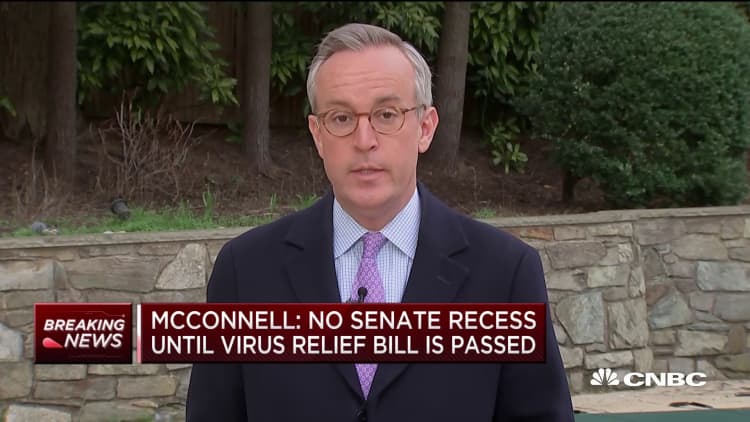Senate Majority Leader Mitch McConnell said Tuesday the Senate will not pass the coronavirus bill approved by the House unless it includes "significant and bold new steps."
If McConnell does make changes, the measure would have to go back to the House for approval.
It could not be immediately determined what steps McConnell, R-Ky., is pushing for, but the stipulations around paid time off were a thorny issue in negotiations between House Speaker Nancy Pelosi, D-Calif., and Treasury Secretary Steven Mnuchin.
Republicans and Democrats have fought to balance giving financial protections to workers who need to stay home and businesses that may be cash-strapped in supporting those workers.

After working into early Saturday morning on putting together a bill with the administration, the House has now issued a correction to the paid-time-off language originally agreed upon.
According to the new language, employees will be entitled to two weeks of sick leave, including those whose children's schools have closed, those who are in quarantine or are taking care of family members. For the next 10 weeks, however, that benefit will only extend to workers who are caring for a child whose school or day care has shut.
Health-care and emergency medical service workers are entitled to paid time off, but there is regulatory authority to exempt them should there be significant shortages of health-care workers.
The Democrats, meantime, ensured that workers would continue to get health coverage during their long-term leave, according to a senior Democratic aide familiar with the negotiations. The speaker also secured a tax credit for small- and medium-size employers offering leave and insurance, to help manage their cash flow.
Trade groups representing medical workers and nurses sent a letter to Pelosi and McConnell on Monday morning asking for at least $1 billion in supplemental emergency funding during the pandemic. The group also urged that the funding be made available without being offset by cuts to existing health programs.
"As schools and childcare facilities shut down during community spread of coronavirus, hospitals may need to provide alternatives so that physicians, nurses and other staff with young children can come to work," wrote leaders of the American Hospital Association, American Medical Association and American Nurses Association.
"This step will be essential in ensuring adequate staffing for caring for the most seriously ill in our communities."


